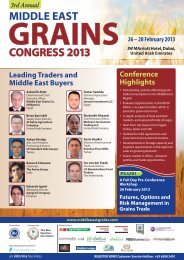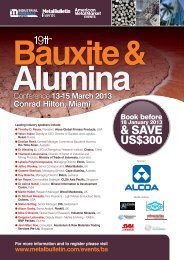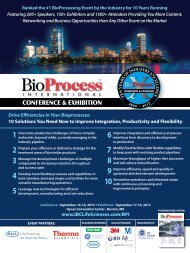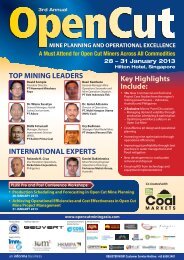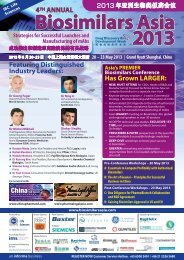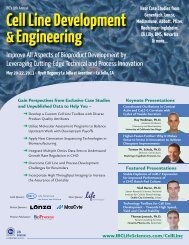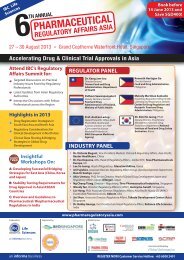The Industry's Preeminent Event on Novel Drug Targets ...
The Industry's Preeminent Event on Novel Drug Targets ...
The Industry's Preeminent Event on Novel Drug Targets ...
You also want an ePaper? Increase the reach of your titles
YUMPU automatically turns print PDFs into web optimized ePapers that Google loves.
C<strong>on</strong>ference Short Courses *<br />
M<strong>on</strong>day, September 23 | 12:00 – 3:00 pm<br />
SC1: New Class of Kinase Inhibitors: Covalent Modifiers<br />
Interest in covalent kinase inhibitors as potential drug candidates is steadily<br />
increasing and there is a growing body of data showing both efficacy and<br />
safety in patients. Covalent inhibitors offer a means of obtaining optimal<br />
target engagement with excellent selectivity and a prol<strong>on</strong>ged durati<strong>on</strong> of<br />
acti<strong>on</strong>. This workshop will cover practical and theoretical c<strong>on</strong>siderati<strong>on</strong>s for<br />
designing selective covalent kinase inhibitors, as well as c<strong>on</strong>siderati<strong>on</strong>s for<br />
testing schemes to examine <strong>on</strong>- and off-target activities.<br />
Instructors:<br />
Alan Corin, Ph.D., Senior Director, Biochemistry and Molecular Pharmacology,<br />
Celgene Avilomics Research<br />
Eric Schwartz, Ph.D., Senior Director, Chemistry, Celgene Avilomics Research<br />
SC2: Practical Aspects of Structure-Based <strong>Drug</strong> Discovery with GPCRs<br />
This course will explore the changes in rati<strong>on</strong>al drug design approaches for<br />
GPCRs in light of the new structural knowledge now available from the many<br />
new GPCR crystal structures. Questi<strong>on</strong>s such as quality of crystal data,<br />
expected throughput and turnaround times and impact <strong>on</strong> modeling activities<br />
will be explored.<br />
Instructor:<br />
Michael Hans<strong>on</strong>, Ph.D., Director, Structural Biology, Receptos<br />
Christopher Tate, Ph.D., Professor, Laboratory of Molecular Biology, MRC,<br />
United Kingdom<br />
SC3: Biochemical and Structure-Based Approaches to Epigenetic<br />
<strong>Drug</strong> Discovery<br />
An increasing amount of chemically tractable compounds modulating various<br />
epigenetic targets are now in pre-clinical and clinical development. However,<br />
obtaining potent, highly-selective and cell-active inhibitors, requires skillful<br />
utilizati<strong>on</strong> of varied assays and screening methods such as high-throughput<br />
screening (HTS), focused screening, knowledge-based and fragment-based<br />
approaches, to efficiently navigate lead discovery of epigenetic targets. This<br />
workshop is designed as a tutorial by discovery leaders to discuss tools<br />
and techniques, applicati<strong>on</strong> specific methods, and best practices for the<br />
development of chemically tractable epigenetic inhibitors.<br />
Instructors:<br />
David Sheppard, Ph.D., Director, Computati<strong>on</strong>al Chemistry, BioFocus<br />
Zhaohui Sunny Zhou, Ph.D., Faculty Fellow, Barnett Institute of Chemical<br />
and Biological Analysis; Associate Professor, Department of Chemistry and<br />
Chemical Biology, Northeastern University<br />
Alan P. Graves, Ph.D., Investigator, Platform Technology and Sciences,<br />
GlaxoSmithKline<br />
Dmitri Kireev, Ph.D., Director, Computati<strong>on</strong>al <strong>Drug</strong> Discovery Center for<br />
Integrative Chemical Biology and <strong>Drug</strong> Discovery Research Professor,<br />
University of North Carolina at Chapel Hill<br />
Rich Cummings, Ph.D., Director, Lead Discovery, C<strong>on</strong>stellati<strong>on</strong><br />
Pharmaceuticals<br />
M<strong>on</strong>day, September 23 | 3:30 – 6:30 pm<br />
SC4: Allosteric Modulators of GPCRs<br />
Allosteric modulators represent a novel paradigm to therapeutically target<br />
G-protein-coupled receptors (GPCRs). However, their identificati<strong>on</strong> and<br />
characterizati<strong>on</strong> using standard functi<strong>on</strong>al assays remain elusive due to the‘c<strong>on</strong>textdependent<br />
phenomena’. This course will discuss important aspects of hit<br />
identificati<strong>on</strong> and validati<strong>on</strong> of allosteric modulators in GPCR research activity.<br />
Instructors:<br />
Corey Hopkins, Ph.D., Research Assistant Professor, Pharmacology, Vanderbilt<br />
University<br />
Debra Kendall, Ph.D., Distinguished Professor & Department Head,<br />
Pharmaceutical Sciences, University of C<strong>on</strong>necticut<br />
Stephan Schann, Ph.D., Head, Research, Domain <str<strong>on</strong>g>The</str<strong>on</strong>g>rapeutics SA<br />
SC5: Advancing Tools and Technologies for Fragment-Based Design<br />
This course aims to introduce the fundamentals of Fragment-based Lead<br />
Discovery (FBLD) to attendees. <str<strong>on</strong>g>The</str<strong>on</strong>g> first secti<strong>on</strong> will focus <strong>on</strong> the c<strong>on</strong>cepts of<br />
using fragments for hit generati<strong>on</strong>. Special emphasis will be placed <strong>on</strong> practical<br />
pitfalls and the many ways to advance fragments to leads and drugs. <str<strong>on</strong>g>The</str<strong>on</strong>g> sec<strong>on</strong>d<br />
part of the course will discuss the variety of fragment screening methods and<br />
when they are best applied. <str<strong>on</strong>g>The</str<strong>on</strong>g> compositi<strong>on</strong> of fragment libraries will also be<br />
discussed in detail. <str<strong>on</strong>g>The</str<strong>on</strong>g> attendees should come away from this course with a<br />
solid understanding of what FBLD is and how to apply it.<br />
Instructors:<br />
Daniel A. Erlans<strong>on</strong>, Ph.D., Co-Founder, Carmot <str<strong>on</strong>g>The</str<strong>on</strong>g>rapeutics, Inc.<br />
Edward R. Zartler, Ph.D., President & CSO, Quantum Tessera C<strong>on</strong>sulting<br />
SC6: Setting Up Effective RNAi Screens: Getting From Design to Data<br />
<str<strong>on</strong>g>The</str<strong>on</strong>g> course is designed to provide in-depth informati<strong>on</strong> <strong>on</strong> how to go about<br />
setting up RNAi screening experiments and how to design assays for getting<br />
optimal results. <str<strong>on</strong>g>The</str<strong>on</strong>g> challenges working with siRNAs and shRNAs and the<br />
delivery reagents needed to get them into the appropriate cells and tissues will<br />
be discussed. <str<strong>on</strong>g>The</str<strong>on</strong>g> instructors will also provide their input <strong>on</strong> best practices for<br />
the executi<strong>on</strong> of experiments and interpretati<strong>on</strong> of results when dealing with<br />
complex biology and informatics.<br />
Instructors:<br />
Caroline Shamu, Ph.D., Director, ICCB-L<strong>on</strong>gwood Screening Facility, Harvard<br />
Medical School<br />
Eugen Buehler, Ph.D., Group Leader, Informatics, Nati<strong>on</strong>al Center for Advancing<br />
Translati<strong>on</strong>al Sciences, Nati<strong>on</strong>al Institutes of Health<br />
John Doench, Ph.D., Research Scientist, Broad Institute of Harvard and MIT<br />
Scott Martin, Ph.D., Team Leader, RNAi Screening, NIH Chemical Genomics<br />
Center, NIH Center for Translati<strong>on</strong>al <str<strong>on</strong>g>The</str<strong>on</strong>g>rapeutics, Nati<strong>on</strong>al Institutes for Health<br />
SC7: Producti<strong>on</strong> and Presentati<strong>on</strong> of Integral Membrane Proteins<br />
for Antibody Discovery<br />
Small molecule pharmaceuticals can exhibit remarkable target specificity.<br />
Nevertheless, the exquisite selectivity towards the desired subtype of an i<strong>on</strong><br />
channel or GPCR is often elusive, resulting in undesirable effects <strong>on</strong> closely<br />
related variants. Antibodies hold promise of even greater specificity, and are<br />
proven to be effective therapeutics targeting certain membrane proteins. Yet<br />
n<strong>on</strong>e of the current targets for approved antibodies is either a GPCR or an<br />
i<strong>on</strong> channel. A main reas<strong>on</strong> for this is the difficulty involved in the effective<br />
presentati<strong>on</strong> of integral membrane proteins for antibody generati<strong>on</strong>-selecti<strong>on</strong>.<br />
This workshop surveys the latest methods and insights to generate useful<br />
antibodies to integral membrane proteins, and to favor the desired binding<br />
interacti<strong>on</strong>s for the therapeutic mechanism or diagnostic purpose.<br />
Instructor: David Bramhill, Ph.D., Principal, Bramhill Biological C<strong>on</strong>sulting, LLC<br />
SC8: Characterizati<strong>on</strong> and Quantificati<strong>on</strong> of Hist<strong>on</strong>e Modificati<strong>on</strong>s<br />
Until recently, standardized high-throughput methods for characterizing and<br />
quantifying post-translati<strong>on</strong>al hist<strong>on</strong>e modificati<strong>on</strong>s have been challenging.<br />
Now, with the applicati<strong>on</strong> of advanced methods utilizing modificati<strong>on</strong>-specific<br />
antibodies and high resoluti<strong>on</strong> mass spectrometry, various strategies have<br />
been developed for precise in vivo m<strong>on</strong>itoring and profiling of hist<strong>on</strong>es, their<br />
variants, reader proteins, the combinatorial hist<strong>on</strong>e code, and the overarching<br />
chromatin landscape in multiple cellular states. This workshop is designed to<br />
provide a tutorial <strong>on</strong> utilizing what is becoming the gold standard for hist<strong>on</strong>e<br />
post-translati<strong>on</strong>al modificati<strong>on</strong> analysis.<br />
Instructors:<br />
Alan Tackett, Ph.D., Associate Professor, Director UAMS Proteomics Facility,<br />
University of Arkansas for Medical Sciences<br />
Sean Taverna, Ph.D., Assistant professor, Pharmacology & Molecular Sciences,<br />
IBBS Center for Epigenetics, Johns Hopkins University School of Medicine<br />
Yingming Zhao, Ph.D., Professor, <str<strong>on</strong>g>The</str<strong>on</strong>g> Ben May Department for Cancer<br />
Research, University of Chicago<br />
“Very fruitful meeting with excellent<br />
basic research and clinical<br />
applicati<strong>on</strong>s.”<br />
CEO Metabolys, Inc.<br />
6 DiscoveryOnTarget.com




